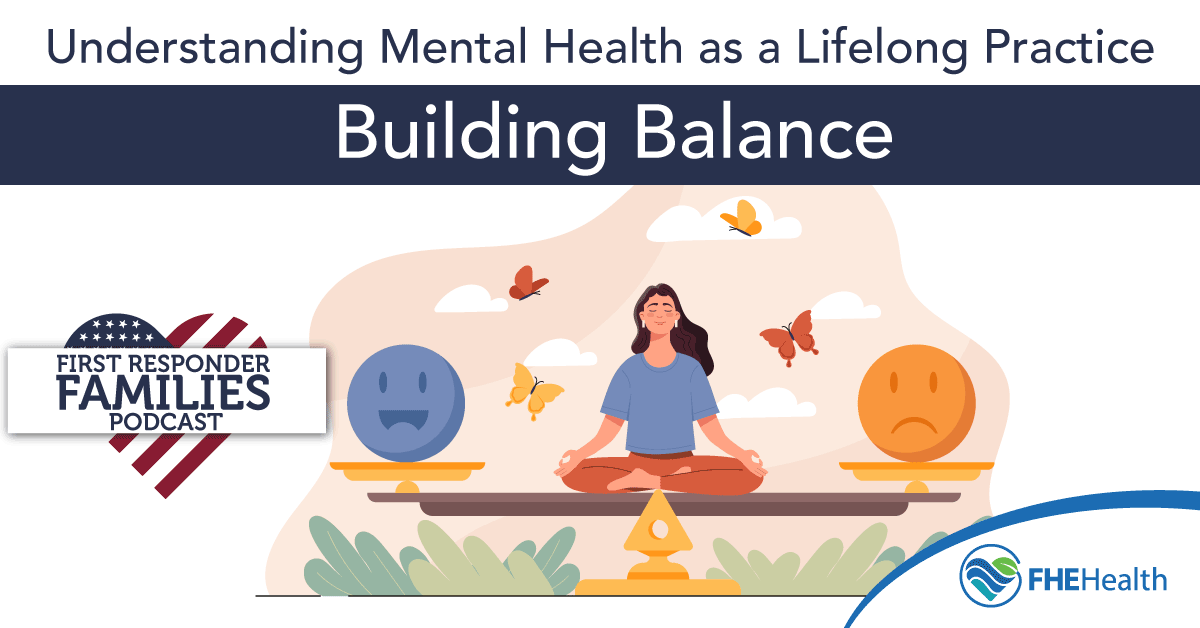
So much of recovery from substance use and mental health disorders happens after inpatient treatment, as individuals strive to build healthy practices in the succeeding days, weeks, months, and years. This aftercare period is critical for the individual, but also for their close loved one(s), according to FHE Health’s Director of Family Services Ivona Bhadha. Bhadha, a family, couples, and trauma therapist, hosts The First Responder Families Podcast. In Episode 15, she invited one of our Shatterproof FHE alumni and his wife to share what has helped them build a balanced, sober lifestyle.
You can catch highlights from Bhadha’s conversation with Tyler and Sam below. (Listen to the full podcast here.) First, a bit about our guests….
About Guest Couple Tyler and Sam
Tyler, a first responder, first came to treatment in 2018. He and Sam were dating at the time. They subsequently broke up before getting back together and then getting married.
In 2023, Tyler came to treatment at FHE a second time. (This is not unusual: Some research has found, for example, that most people with substance use disorders need treatment twice to achieve successful recovery; and others may need it more.)
By now, Tyler and Sam were navigating life’s ups and downs as a married couple. This time when Tyler went to treatment, Sam joined FHE’s support group for family members, and she assured Tyler that she’d be waiting for him upon his completion of treatment.
What helped these two face the challenges of life after treatment and even grow closer in their relationship? Read on for inspiration.
Highlights from the Podcast
Support Groups for Each Partner in the Transition Home
Tyler: …It was cool for [Sam] to have a support group … while I had my own support group….
Bhadha: So, it was the community that really held you both, even if you were healing parallel in separate groups, but then you were more prepared to meet back home….
Sam: What really helped me was I was still talking to you when [Tyler] came home. It was for like three or four weeks. And that helped because that’s a whole transition … you can’t just pick up from where you were. There’s so much damage, and there’s so much healing that needs to happen … Those meetings helped because other women that I was close to, they were going through the same thing.
Mutual Support and a Shared Commitment to Sobriety
Tyler: [Sam’s] been sober just as long as me.
Sam: It’s definitely difficult. I miss the social aspect of it, but it has made our marriage so much stronger. And … I would take our marriage over a drink any day.
Bhadha: Like you are a peer support to each other in a way.
Tyler: ….It is really cool to … know that we can do things that don’t involve us sitting at the brewery playing a board game … we can go see a band and see the whole show and actually enjoy the show … When it was just me not drinking, it was very, very hard. Now that it’s both of us, we find other stuff.
Bhahda: Would you say that really the commitment to be sober … makes those setbacks in life or some stress in life at work easier?
Tyler: Yeah, 100% … It’s easier to manage the stress.
Prioritizing Self-Care and Managing Stress
Bhadha: How do you take care of yourself? Any practices that you continue to do for you after Shatterproof or anything that helps you to manage stress for both of you?
Tyler: The main thing is the program that I’m part of right now. I need your support with, you know, speaking to somebody privately and having a [peer] support group … what I have … with the first responders … You form new habits. We both walk now. We’re like the old couple in the neighborhood. We walk around, look at houses; it’s great. Ride bikes … I’m trying to eat healthy.
Healthy, Honest Communication
Bhadha: You speak the language of health, taking care of your health, having your own agency to choose how you will improve your health. And I can see how your marriage is really nourished by your individual self-care and … how you show up for each other.
Sam: It’s been really great … I’m still doing my yoga, and … what has helped us is we talk. We’re very open. If there’s something bothering me, he knows I’ve always been like this. I let it out. If there’s something bothering him, he talks to me. So I think that’s important when we’re in a sober house. If there’s things that come up for him, let’s talk about it. If there’s things that are coming up for me, let’s talk about it. In the past … we would not discuss it.
What helped Sam and Tyler manage their triggers and rebuild trust in the aftermath of addiction? Tune in for their answers here.






